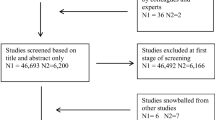Abstract.
Effects of sex preference on investments in children‘s human capital, bequests and fertility are studied, with and without sex selection, in a model based on parental altruism. Both pure sex preference, a feature of the parental utility function, and indirect preference, which arises from gender-related differences in earnings opportunities, are examined. When there is no gender control the impact of pure sex preference is seen in smaller consumption for daughters than for sons. However, when gender control is exerted, sex preference raises the sex ratio and it is possible that sisters may, on average, consume no less than their more numerous brothers. In an example of the model with specific functional forms, parents who practise gender control have larger families than if sex selection techniques were unavailable. The effect is magnified if sons‘ earnings opportunities are better than daughters‘.
JEL classification: D11, J13, J16
Similar content being viewed by others
Author information
Authors and Affiliations
Additional information
Received August 31, 1995 / Accepted May 2, 1996
Rights and permissions
About this article
Cite this article
Davies, J., Zhang, J. The effects of gender control on fertility and children‘s consumption. J Popul Econ 10, 67–85 (1997). https://doi.org/10.1007/s001480050031
Issue Date:
DOI: https://doi.org/10.1007/s001480050031




